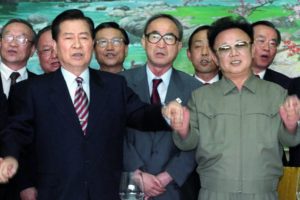Special to WorldTribune.com
 By Donald Kirk
By Donald Kirk
Following is an excerpt from a book by WorldTribune and Geostrategy-Direct columnist Donald Kirk and the Korean author Kim Ki-Sam, “How South Korea’s Kim Dae-Jung bought his Peace Prize and financed Kim Jong-Il’s nuclear program”.
South Korea’s first woman president has been impeached over allegations involving a confidante, but this book spotlights what appears to be a scandal of epic scale.
While the governments of South Korea and the United States helped suppress publication of this book in both countries, it has been published to acclaim in Norway, the home of the Nobel Peace Prize.

______________
In Dec. 11, 2011, Kim Ki-Sam, a former junior intelligence officer of the Republic of Korea, finally ended his long-lasting battle against the prosecutor of the U.S. Citizenship and Immigration Services. That was the day Judge Charles M. Honeyman [in Philadelphia granted] political asylum to Ki-Sam along with his wife and two teen aged children.
Kim’s family had applied for asylum in December 2003 after Kim had revealed the manipulations and machinations preceding the June 2000 North-South Korea Summit (hereafter “June 2000 Summit” or “Summit”) and the awarding of the Nobel Peace Prize to the South Korean president, Kim Dae-Jung (DJ), in December 2000.
With that legal victory, the ex-agent for the multi-tentacled National Intelligence Service (NIS) defeated an intensive U.S. government bid to have him extradited to Seoul and imprisoned for revealing the payoffs, among other acts of corruption, and suspicions of North Korean espionage within Kim Dae- Jung’s government.
The decision was extraordinary for two reasons:
First, Kim Ki-Sam was not a refugee or defector from an oppressive regime. Rather, he was a patriotic Korean who saw his exposé of Kim Dae-Jung’s relentless pursuit of the Nobel as his duty to his country.
Second, the United States had invested the time and resources of a top attorney from the Department of Homeland Security to fight Kim Ki-Sam’s application in a prolonged process lasting eight years before ending in a humiliating court-ordered rebuff.
[Part I: How South Korea’s Kim Dae-Jung bought his Peace Prize and financed Kim Jong-Il’s nuclear program, Feb. 2]In fact, Judge Honeyman’s decision marked the second time that Kim Ki-Sam had won the battle in court. The same judge approved Kim’s application for asylum on April 15, 2008.
Judge Honeyman described Ki-Sam as “essentially the classic defector”— a view the prosecutor vowed to appeal.
The judge’s comments on the prosecutor’s opposition to asylum for Ki-Sam sounded almost like a reprimand. “Despite repeated orders to submit an opinion from the U.S. government, there has not been an individualized opinion from the Department of State, nor any comments apparently from any security agencies,” he wrote at the time. Incredibly, he added, the government had not answered that request “despite the zealous efforts of many of its trial attorneys over the course of this case.”
One week after Judge Honeyman rendered his first decision, Donald Kirk, who had been a correspondent for forty years in Asia, encountered Kim Dae-Jung and his top aide, Park Jie-Won, at a luncheon on April 22, 2008, at the Fletcher School of Law and Diplomacy at Tufts University in Medford, Massachusetts. The luncheon was hosted by Stephen Bosworth, dean of the school, who had been ambassador to South Korea when DJ was president.
After the lunch, Park Jie-Won, at a press conference for the South Korean media, flatly denied, as he had been doing for many years, all of Kim Ki-Sam’s allegations. “It is an absurd and groundless accusation,” Park told South Korean reporters. “It is not worthy of response.”
Spurning the impassioned pleas of the U.S. government, however, Judge Honeyman rejected the last appeal of the U.S. prosecutor and ordered asylum in the United States for Kim Ki-Sam and his family. In his final ruling, the judge found “a reasonable possibility” that Kim Ki-Sam would “suffer the alleged persecution upon his return to South Korea” and that he was “statutorily eligible for asylum based on his well-founded fear of persecution by the South Korean government and the NIS, based on his political opinion.”
This time, however, the U.S. prosecutor wisely chose not to appeal again, and Kim Ki-Sam became the first Korean whistle-blower ever granted asylum in the United States or, for that matter, anywhere else.
See: Part I: How South Korea’s Kim Dae-Jung bought his Peace Prize and financed Kim Jong-Il’s nuclear program, Feb. 2
See: Part 3:Politicized intelligence, South Korean-style, Feb. 20
